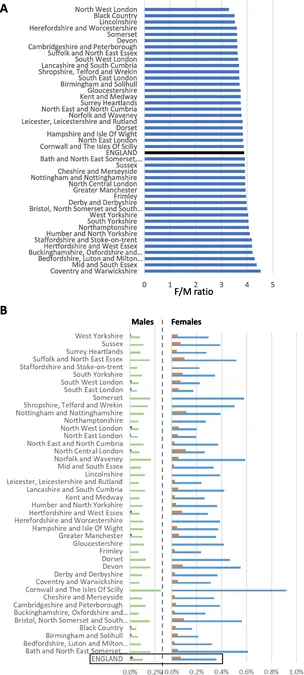
Shocking Disparities in ME/CFS Diagnosis Across England: Who's Being Left Behind?
2025-04-21
Author: Sarah
Understanding Myalgic Encephalomyelitis (ME/CFS) in England
Myalgic Encephalomyelitis, commonly known as ME/CFS, is a debilitating condition that drastically diminishes the quality of life for those affected. Individuals with ME/CFS often face prolonged periods before receiving a diagnosis, as there is currently no definitive test for this complex illness. Alarmingly, its prevalence is obscured by inconsistent diagnostic practices and misdiagnoses, making it a hidden epidemic.
Key Findings from NHS Data
A comprehensive analysis of NHS data spanning over three decades revealed troubling trends: 100,055 diagnoses of ME/CFS were recorded in England from 1989 to 2023, which constitutes just 0.16% of the total registered patients. Notably, 79,445 of these patients were female, leading to a staggering female-to-male ratio of approximately 3.88:1, which reached peaks of nearly 6-to-1 in certain age groups.
Widespread Disparities Based on Ethnicity and Location
The diagnosis of ME/CFS varies significantly across 42 Integrated Care Boards (ICBs), with some regions showing diagnosis rates as low as 0.086% for females and 0.024% for males. Strikingly, White individuals were five times more likely to be diagnosed compared to those from Black, Asian, or other ethnic backgrounds. Shockingly, in some ICBs, records showed fewer than eight non-White individuals diagnosed with ME/CFS, despite the presence of nearly 300,000 non-White registered patients.
Who is Being Ignored?
The data suggests that older females over 60, older males over 80, and individuals from deprived areas are disproportionately underdiagnosed. The estimated lifetime prevalence of ME/CFS may reach up to 0.92% for women and 0.25% for men, implying that around 404,000 individuals in the UK could be living with this condition, many of whom may never receive appropriate recognition or treatment.
A Call for Change in ME/CFS Diagnosis
These staggering inequalities highlight the urgent need for improved diagnostic practices and healthcare policies that prioritize equitable access. With barriers in place, particularly for ethnic minorities and those in socioeconomically deprived areas, many patients are left without the much-needed support to manage their symptoms.
Conclusion: Towards Better Healthcare for All
Addressing these disparities in ME/CFS diagnosis is crucial for ensuring that all patients receive the care they deserve. As public health and policy decisions are informed by such prevalence data, it is imperative that healthcare systems adapt to eliminate barriers and foster inclusive environments for those suffering from ME/CFS.



 Brasil (PT)
Brasil (PT)
 Canada (EN)
Canada (EN)
 Chile (ES)
Chile (ES)
 Česko (CS)
Česko (CS)
 대한민국 (KO)
대한민국 (KO)
 España (ES)
España (ES)
 France (FR)
France (FR)
 Hong Kong (EN)
Hong Kong (EN)
 Italia (IT)
Italia (IT)
 日本 (JA)
日本 (JA)
 Magyarország (HU)
Magyarország (HU)
 Norge (NO)
Norge (NO)
 Polska (PL)
Polska (PL)
 Schweiz (DE)
Schweiz (DE)
 Singapore (EN)
Singapore (EN)
 Sverige (SV)
Sverige (SV)
 Suomi (FI)
Suomi (FI)
 Türkiye (TR)
Türkiye (TR)
 الإمارات العربية المتحدة (AR)
الإمارات العربية المتحدة (AR)